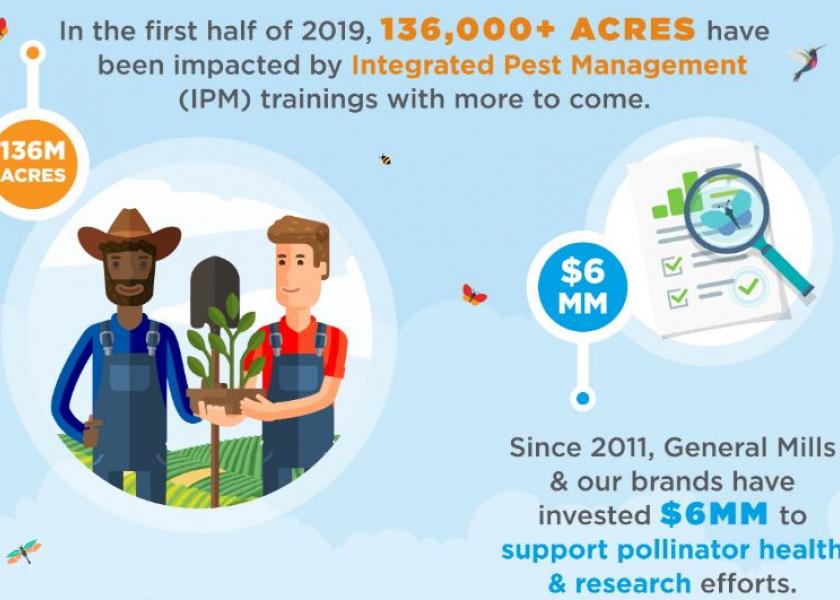General Mills Shares 4 Ways It Will Reduce Pesticide Use

General Mills has outlined its four key strategies to reduce synthetic pesticide use in its supply chain:
- Regenerative agriculture
- IPM practices
- Organic acreage expansion
- Pollinator habitat
In its online report, the company says, “At General Mills, our practices and processes ensure that all of our products are safe and comply with all regulatory limits. Recognizing that our products are only as safe as the ingredients in them, we utilize supplier trainings and audits to proactively manage our ingredient quality and safety standards.”
The company statement also includes, “Farmers in our supply chain are careful to comply with the permitted uses of pesticides. To further ensure the safety of our products, for raw oats, we maintain a rigorous process of de-hulling, cleaning and flaking prior to use as ingredients in our products.”
Here are more details in how the company will put into practice the four strategies:
Regenerative Agriculture
In 2019, the company announced a goal to advance regenerative agriculture practices on one million acres of organic and conventional farmland by 2030. That is estimated to equal more than 20% of General Mills’ sourcing footprint in North America.
To launch the effort’s first phase, General Mills has partnered with Understanding Ag to include:
- Multi-day workshops to educate farmers on the principles of regenerative agriculture with 100 farms representing over 350,000 acres in attendance in year 1.
- One-on-one technical support for 45 farmers across North Dakota and Canada to transition to regenerative agricultural systems equating to approximately 50,000 acres. Click here for a map
- Soil health, biodiversity, and economic analysis on one field per farm over 3+ years to assess key outcomes associated with transitions to regenerative systems.
- Collective research about the links between farm management, soil health, and different forms of biodiversity.
Integrated Pest Management
In fiscal year 2017, the company commissioned an analysis by the IPM Institute of North America. This study specifically assessed the scope of IPM adoption and pesticide use in its North American supply chains for five major crops: corn, oats, soybeans, sugar beets and wheat. This data is being used a benchmark for continued improvement.
Expanding Organic Acreage
The company has stated a goal to more than double organic acreage from 120,000 acres to 250,000 acres between 2015 and 2019. Through its fiscal year 2018, the company says its now the second largest natural and organic food producer in the U.S. having reached 200,000 acres.
One example is its partnership with Midwestern BioAg providing consulting services to farms as they transition to organic. This includes the deal with 34,000 acre Gunsmoke Farms, which is located west of Pierre South Dakota.
Promoting Pollinator Health
Gunsmoke Farms will also plant close to 3,000 acres of pollinator habitat throughout the farm in partnership with the Xerces Society for Invertebrate Conservation (Xerces Society).
Additionally, General Mills has released its Pollinator Research Action Plan, which is consistent with the commitment to integrated pest management, and recognizes the responsible use of and the concerns about the use of neonicotinoids.
In fiscal year 2017, the company started a five-year project with the USDA and the Xerces Society to protect and establish healthy pollinator habitats. The company will donate $400,000 each year, which will be matched by the Natural Resources Conservation Service, to support eight full-time NRCS field biologists who assist growers in implementing pollinator habitats.
For the past eight years, General Mills has invested more than $6 million in educating consumers and supporting pollinator habitat and research efforts. Click here for more about these pollinator education efforts.
Click here for the full pesticide reduction plan from General Mills.







